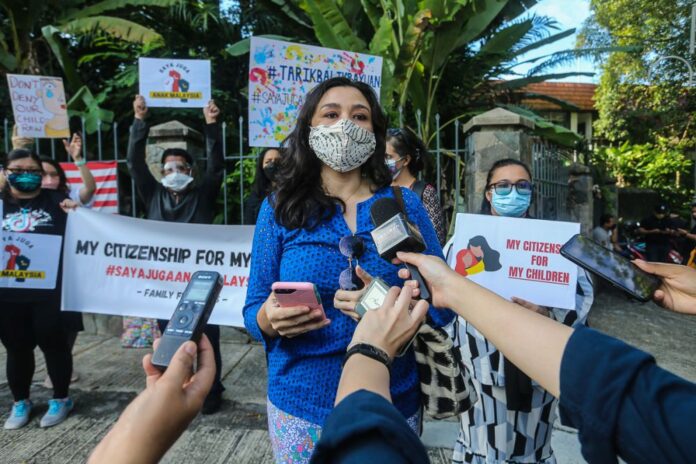Family Frontiers president Suriani Kempe speaks to reporters outside the Parliament building in Kuala Lumpur September 23, 2021. — Picture by Yusof Mat Isa
KUALA LUMPUR, Oct 8 — Human rights advocates, lawmakers and concerned mothers reiterated their stance for the need to reform “outdated” and “unfair” Malaysian citizenship laws that penalise Malaysian women for having children abroad.
Among these advocates were Suriani Kempe, president of Family Frontiers, who said the established citizenship laws, which confer citizenship automatically on children born overseas to the foreign spouses of Malaysian men — a right not extended to Malaysian women — are ultimately not sustainable and unjust.
“All of which is to say this is not a system that is sustainable, fair or just. It puts unnecessary strain on Malaysian women and punishes them simply for being women. It also punishes their children and their entire extended family.
“What we need today is compassion. We need to see past the legal roadblock, past the antiquated and outdated demands that we place unfairly and solely on Malaysian women and we need to fix things.
“Malaysian women have been living with this injustice since independence. Every day the government maintains its appeal to the High Court decision. Every day the government delays the Federal Constitution is another day that a child of Malaysian women goes without access to education, healthcare or therapy.
“It is another day that Malaysian women are left vulnerable to arbitrary decision making. It is another day that their mental health and wellbeing and that of their family continues to be affected. All of which is to say that we cannot wait any longer and the time for change is now, and implore the government to either withdraw the appeal or expedite the amendments to the Federal Constitution. But it needs to happen now,” she said during a forum discussing the citizenship issue earlier today.
Suriani was referring to the recent action by the federal government to appeal a landmark ruling on September 9, which finally recognised children born abroad to Malaysian mothers and their foreign spouses as Malaysian citizens.
The lawsuit against the government was filed by Family Frontiers together with six Malaysian mothers.
Today’s forum and subsequent press conference dubbed “The Other Side Of The Story — Do Mothers Have Rights?, were hosted by Penang Women’s Development Corporation (PWDC) and was attended by representatives from Family Frontiers as well as affected and concerned mothers.
Apart from Suriani, other speakers included Batu Kawan MP Kasthuri Patto, Senator Fadhlina Sidek and Penang social development and non-Islamic religious affairs committee chairman Chong Eng.
In her opening speech, Chong urged the government to take its own words seriously by addressing the concerns of Malaysian women, including recognising their children with foreign spouses as Malaysian citizens.
She stated the government should not pay “lip service” by merely including a section within the 12th Malaysia Plan specifically dedicated to women yet not address their issues seriously.
“The (Federal) Constitution can be amended when necessary. So what we want from the government today is (for them) to take their (own) words seriously. To show what they really mean when put a women chapter in the RMK12. Don’t pay lip service,” she said.
Chong also pointed out that the Malaysian government had previously initiated a recruitment drive via TalentCorp Malaysia to attract Malaysian talent working overseas to return.
Through the recruitment drive, Chong said the government found many talented Malaysian women working abroad however many could not return as their marriage to foreign spouses complicates the process of building a future for their family back in Malaysia
“There are many talented women overseas and they want to come back and serve but we have this obstacle and they can’t come back.
“Yes, they have married someone overseas but if they believe it is their jodoh (fate) to marry someone overseas, I mean what can they do? It should not be a reason to give them fewer rights as a mother just because they married a foreigner and gave birth to a child in a foreign land,” she said.
During her speech, Dewan Negara Senator Fadhlina also argued against the narrative presented by the Home Ministry that the issue at hand involves matters of “national security” and aims to prevent children born abroad from gaining double citizenship.
Fadhlina explained the concern stemming from supposed threats to national security or national sovereignty, or issues of treason can be prevented via enforcement of the law.
“It does not make sense that such incidences could happen. Moreover, that the application is being filed by children that are clearly incapable or present any sort of threat.
“The concern that the (foreign) father of the child gaining citizenship from that process is also unfounded as the established laws do not favour such conditions,” she said.
For further context, High Court judge Datuk Akhtar Tahir on September 9 ruled that the word “father” must be read to include “mother” and that their children are entitled to citizenship by operation of law, and that the citizenship right provisions (Article 14(1)(b), Section 1(b), Section 1(c)) have to be read in harmony with the Federal Constitution’s Article 8(2) which prohibits gender discrimination.
Currently, Malaysian mothers who are married to foreigners have to apply for their children born abroad to have Malaysian citizenship, a process that is said to typically take years before the Malaysian government responds and with no guarantee that the child would become a citizen as the government can reject such applications.
In comparison, Malaysian fathers would be able to confer their citizenship to children who are born abroad, which means they are automatically recognised as citizens and do not have to go through the same arduous and lengthy process of applying for citizenship.



